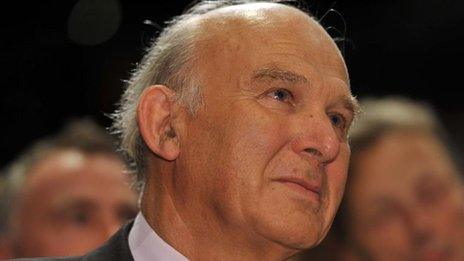Cable warns overseas students in 'immigration panic'
- Published

Vince Cable warned against "absurd" visa regulations to "placate public panic"
The "torrid" debate about immigration is in danger of damaging the economically valuable recruitment of overseas students to the UK, says Business Secretary Vince Cable.
Speaking at a Global University Summit in London, Mr Cable warned overseas students had become caught up in the "public panic" over migrant numbers.
Mr Cable said it was "absurd" to see a cut in student numbers as a triumph.
And he told his international audience there was no cap on overseas students.
Sir Andrew Green of Migration Watch said that Mr Cable was "completely out of touch with public opinion".
The business secretary, addressing a gathering of university and industry leaders, said that higher education must be an important driver of economic recovery.
'Politics of identity'
But he warned that the globalised world of university recruitment was in danger of being undermined in the UK by anxieties over immigration.
He said that the "politics of identity" which worried about immigration and the economic need for open markets were forces "pulling in opposite directions".
The debate about overseas students was "caught up in this torrid and emotional argument about immigration", said Mr Cable.
Even though there were no set limits on overseas student numbers, the drive to prevent the misuse of student visas had created a "perception" that the UK did not want overseas students, said Mr Cable.
This was particularly the case in India, he said, and that fewer students are now coming from India.
Mr Cable told the conference, organised by the University of Warwick, that highly-skilled overseas staff working in the UK could face "absurd" visa regulations, which had been created to "placate public panic".
The recruitment of overseas students had been "seriously distorted" by the tensions over immigration, he argued. And he said it was "absurd" to see a cut in student numbers as a "triumph for immigration control".
University leaders have campaigned for overseas student numbers to be considered separately from the headline figures for migration, but the government rejected this argument.
Global competition
The event in London, with representatives from 27 countries, is examining how universities can work with industry to drive economic growth.
Mr Cable pointed to the cluster of technology firms around Cambridge and how university systems around the world wanted to develop their own versions of Silicon Valley.
"Innovation spins directly out of the applied work of universities," said Mr Cable.
"A key part of industrial strategy is to build links with education," he said.
This was also against a background of global competition. The business secretary said that India would produce 40 million new graduates in the next decade, and that economies in the west would have to compete with these "staggering numbers".
Reaching the international demand for higher education would also mean using online technology such as the so-called MOOCs (massive online open courses), he argued.
As a former Open University tutor, Mr Cable said that he rejected the idea that such distance learning was not "proper learning".
The Mayor of London, Boris Johnson, also told the conference that overseas students were an important source of income, worth £870m in tuition fees in London alone.
He urged UK universities to be "even bolder" in promoting their courses around the world.
Mr Johnson hailed the success of Tech City in London as an example of how technology start-ups could develop "in the penumbra of our universities".
Sir Andrew Green, chairman of Migration Watch UK, rejected Vince Cable's warnings about overseas students.
"Vince Cable might not want to control immigration but the public overwhelmingly do."
- Published4 March 2013
- Published26 February 2013
- Published22 January 2013